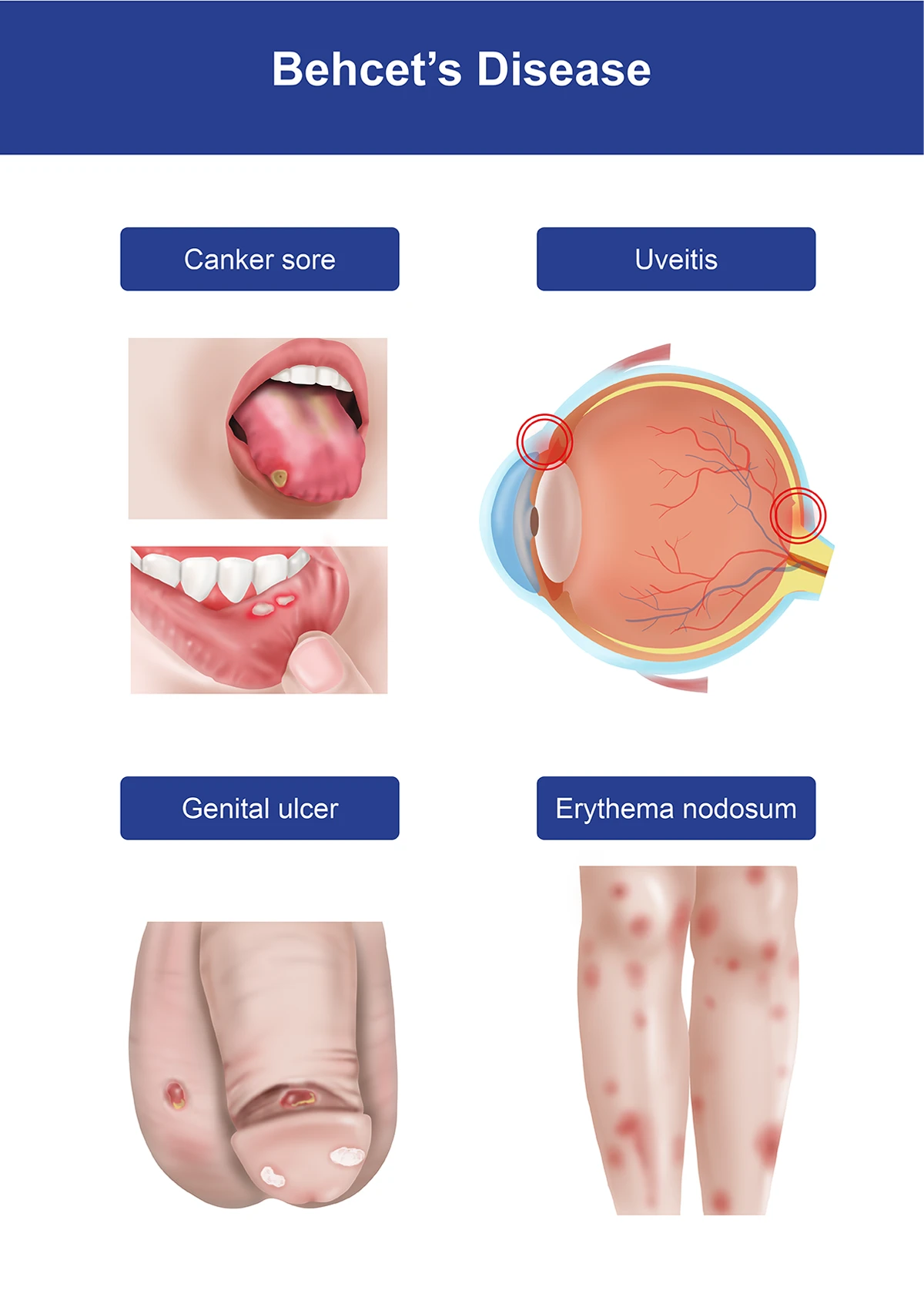Behcet’s disease
Encuentre un médicoBehcet’s disease is a complex chronic condition that causes a variety of symptoms in different parts of the body. For some people, Behcet’s disease symptoms get less serious as they get older and for others, symptoms get worse. Behcet’s disease can have periods of remission when symptoms go away for a while.
You can trust the specialists at Advocate Health Care to evaluate your symptoms as they work toward a clear diagnosis.
What is Behcet’s disease?
Behcet’s disease is a rare chronic condition that causes inflammation of blood vessels (vasculitis) in different parts of the body. Behcet’s disease, also known as Behcet’s syndrome, usually affects small blood vessels in places like the eyes and the skin. However, it can also affect arteries and veins in joints, internal organs, the digestive system or the central nervous system (brain and spine).
Cause of Behcet’s disease
The cause of Behcet’s disease hasn’t been discovered yet. Some things that seem to be associated with it are environment and certain genes. Viral or bacterial infections may also be involved.
Is Behcet’s disease serious?
Behcet’s disease may become serious when it affects the eyes, brain, spine, gastrointestinal system or the heart. In such cases, Behcet’s syndrome may cause a disability or be life-threatening.
However, most people can live a normal life with Behcet’s disease when treatment is begun promptly and adjusted when symptoms change or get worse.
Behcet’s disease symptoms

Behcet’s disease causes widespread symptoms including canker sores in the mouth, eye inflammation, genital ulcers, and reddish, painful lumps on the legs.
The first Behcet’s disease symptoms are usually painful sores on the mucous membranes inside the mouth. These mouth sores usually heal within days or weeks, but they may come back. Similar sores may also appear on the genitals of men or women.
Other early symptoms of Behcet’s disease may include inflammations in different parts of your eyes (uveitis). You may notice pain, tearing, blurred vision or unusual sensitivity to light. The inflammation in your eyes may go away and come back repeatedly, which may lead to long-term problems with your vision or blindness.
Other Behcet’s syndrome symptoms don’t usually happen until months or years after the first symptoms are noticed. Pueden incluir:
- Sores or skin rashes on the skin of other parts of the body.
- Ulcers in the digestive system.
- Joint pain, especially in the knees, ankles, elbows and wrists.
- Central nervous system symptoms of headaches, fever, stiff neck or ataxia.
- Blood vessel symptoms such as blood clots, stroke or aneurysm.
Risk factors for Behcet’s disease
Behcet’s disease is rare in the United States and western Europe. It’s more common in Turkey, Japan, Korea, China, Iran and Saudia Arabia , although the reasons for these differences aren’t known.
The first symptoms of Behcet’s disease usually happen between ages 30-40.
Diagnosis of Behcet’s disease
Behcet’s disease diagnosis is difficult because the symptoms may develop over a long period of time and may mimic other diseases like Crohn’s disease, lupus, arthritis or multiple sclerosis.
To diagnose Behcet’s disease, your doctor will need to know about all the potential Behcet’s disease symptoms you may have had. They’ll also need to perform blood tests or imaging tests to rule out other possible causes of your symptoms.
Because Behcet’s disease symptoms affect so many parts of the body, your condition may need to be evaluated by some or all these specialists:
- Ophthalmologist
- Dermatologist
- Rheumatologist
- Urologist
- Gastroenterólogo
- Hematologist
- Neurólogo
It may take months for a diagnosis of Behcet’s disease to be confirmed. Your doctor will keep you informed about what treatments they’re recommending and where they are in the process of deciding on a diagnosis.
Behcet’s disease treatments
Your Behcet’s disease treatment will be focused on treating your symptoms. Sores on the skin or genitals may be treated with topical medications in lotion or ointment form. Mouthwash may help any Behcet’s disease pain in the mouth.
Oral medications may also be recommended for Behcet’s disease treatment. Nonsteroidal anti-inflammatory drugs (NSAIDs), corticosteroids, anticoagulants or medications that block the immune response may be prescribed for other symptoms.
Talk to your doctor about the possibility of taking part in research that may be searching for new treatments or to discover more about Behcet’s disease.
Reciba atención
Le ayudamos a vivir bien. Estamos a disposición para ayudarle, personalmente o en línea.